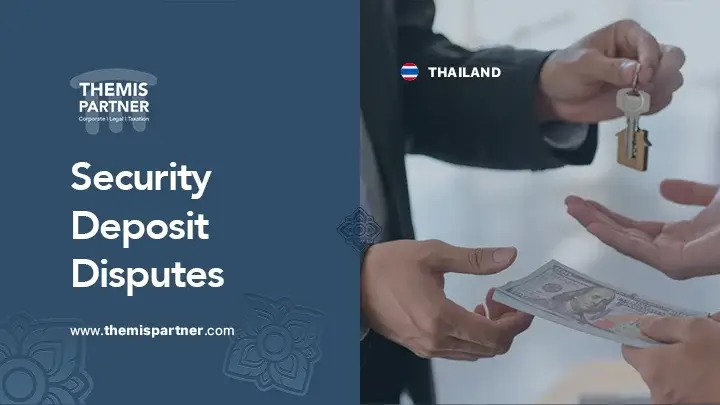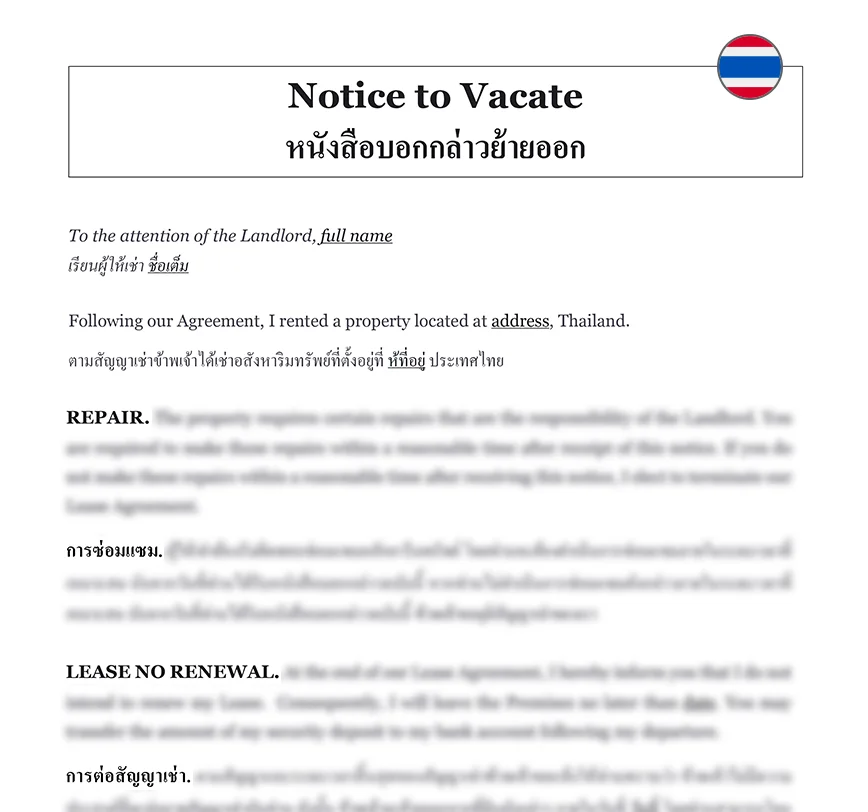Did you know that under new 2025 regulations, landlords must now return deposits within as little as 15 days in some cases, with strict rules on what they can deduct?
Navigating security deposit disputes in Thai rentals can be complex, especially when so many agreement terms still rely on clear proof and timely action.

If you are a business owner, professional, or expatriate renting in Thailand, understanding how to protect your deposit is now more critical than ever. Recent legal updates give tenants more leverage while holding landlords to higher standards of transparency and accountability.
From updated deduction limits to faster return timelines, staying informed means you can confidently resolve issues before they escalate. Documented evidence and a structured approach are your best tools for a fair outcome.
Key Takeaways
- Security deposits in Thailand are typically 1-2 months’ rent and must always be documented with receipts.
- Landlords can deduct only for proven damages or unpaid bills; not normal wear or minor scuffs.
- Deposits must be returned within 30 days (15 days for large landlords) under 2025 rules.
- Protect yourself with photos, checklists, and written records at move-in and move-out.
- Avoid vague lease clauses or automatic forfeiture terms.
- Negotiate using clear evidence to resolve disputes quickly.
- If unresolved, seek help from the Consumer Protection Board or local district offices.
- Submit written refund requests immediately after move-out to ensure timely deposit return.
Table of Contents
-
Security Deposits in Thai Rentals
-
Getting Your Deposit Back
-
Legal Rights for Tenants and Landlords
-
Resolving Security Deposit Disputes
-
Special Cases & Practical Support
-
FAQ: Security Deposits in Thailand
-
Conclusion
Security Deposits in Thai Rentals
Standard Security Deposit Rules
Security deposits in Thailand serve as financial protection for landlords, ensuring tenants cover any damage beyond normal use or unpaid bills.
Standard deposit amounts typically equal one to two months’ rent, with payment made either by cash or bank transfer. Receipts are essential and must always be provided for each transaction.
Deposit requirements may vary locally: Bangkok rentals often require higher deposits than properties in other regions. No Thai law mandates landlords to hold deposits in escrow, so funds remain in the landlord’s account, presenting both risks and a need for clear written agreements.
For guidelines and rights, refer to the Thailand Consumer Protection Board.
Common Deposit Dispute Causes
Disputes over security deposits often arise from:
- Damage claims versus what qualifies as normal wear and tear
- Unpaid utilities or outstanding bills
- Vague or conflicting lease terms
- Delayed deposit returns after move-out
Recent 2025 regulations now restrict practices such as automatic forfeiture of deposits and require clear itemized deductions, making tenant rights more explicit.
Strong documentation and timely communication are the best ways for tenants and landlords to avoid misunderstandings.
Takeaway: Always keep records, photos, receipts, and signed checklists are essential tools to protect your deposit interests.
Looking to buy, sell, or lease property in Thailand?
Our team handles registration, title searches, purchase and lease agreements and all property rights.
Getting Your Deposit Back
Preparing for a Smooth Return
The key to reclaiming your security deposit in Thailand rental properties is organization from the start.
At lease signing, always:
- Use a detailed property checklist
- Take timestamped photos or videos of all rooms and fixtures
- Request a signed, itemized receipt for both your security deposit and initial rent
Throughout the lease, track all payments digitally and keep written communication with your landlord.
When moving out:
- Schedule a property walkthrough with your landlord within 24-48 hours after vacating
- Bring a neutral witness if possible
- Update your original photos to show the current property condition
Walkthrough videos are your strongest proof when facing damage claims.
Allowed and Prohibited Deductions
Thai law only allows landlords to deduct for:
- Verified property damage exceeding normal wear and tear
- Unpaid rent or confirmed outstanding utility bills
They cannot deduct for issues such as lightly faded paint, small nail holes, or minor scuffs.
Natural disaster-related damage is excluded from tenant responsibility.
Recent 2025 rules require landlords to issue an itemized deduction statement and follow strict timelines, 30 days standard, faster for multi-unit landlords.
Legal Rights for Tenants and Landlords
Key Thai Rental Laws
Under Thailand’s Civil and Commercial Code, plus new 2025 regulations, landlords are legally required to return security deposits for rental property in Thailand within 30 days after lease termination. Landlords with three or more units now face even shorter timelines if no property inspection is needed.
Landlords must provide a written, itemized statement for any deductions, covering only:
- Damages beyond normal wear and tear
- Unpaid rent or utility bills
Any deduction must be supported by clear evidence. Deposits cannot be used for losses from natural disasters.
For a deeper understanding, read the new rights for renters in Thailand 2025.
Regulations now give tenants stronger leverage against unfair deposit deductions.
Obligations and Lease Clauses to Check
Always review lease clauses about security deposits carefully.
Watch for these red flags:
- Unclear or broad language allowing arbitrary deductions
- Clauses waiving your right to challenge deductions
- Provisions for automatic forfeiture, which the law now often invalidates
Strong, evidence-backed documentation helps resolve most disagreements before escalation.
Thorough review and documentation ensure both parties know their precise rights, reducing misunderstandings and empowering fair negotiation.
Resolving Security Deposit Disputes
Negotiation and Documentation Tips
Start with direct negotiation, using evidence to support your request for a fair security deposit return.
Prepare these before speaking with your landlord:
- Entry and exit photos or video walkthroughs
- Digital and physical checklists from move-in and move-out
- Payment histories and lease agreements
Follow the “3S Dispute Model”:
- Clearly state the Situation (including the lease’s end date and current deposit status)
- Present Supporting evidence (like annotated photos and receipts)
- Offer a Settlement proposal in writing, requesting an itemized deduction list if the full deposit is not returned
Keeping communications respectful and focused helps maintain momentum and avoids escalation.
Mediation and Legal Escalation
If talks fail, mediation is available at:
- Local district offices
- The Thailand Consumer Protection Board
- The Lawyers Council of Thailand
Filing a civil complaint in Thai courts requires:
- Submitting documentation (photos, contracts, payment proofs)
- Understanding timelines (deposits typically must be returned within 30 days or faster under 2025 regulations)
- Attending mandatory pre-trial mediation (with most cases settling before judgment: over 60 percent resolve at this stage)
Visit the Thai Courts of Justice for process details and judicial guidance.
A proactive, evidence-first approach gives both tenants and landlords the best chance to resolve disputes efficiently. Structured documentation and clear communication are your most reliable tools in every case.
Special Cases & Practical Support
Delayed or Withheld Deposits: Remedies
If your security deposit is not returned on time in Thailand, act quickly by following these steps:
- Send a formal written notice to your landlord requesting the deposit return and stating the lease end date.
- If no response is received within 7 days, notify the local Consumer Protection Board or file a complaint with district mediation offices.
- Under the latest 2025 regulations: landlords with three or more rental units must return deposits within 15 days, or face statutory penalties.
Download the Notice to Vacate Letter to formally end a tenancy according to Thai law.
The law prohibits withholding for natural disaster damage or “normal wear and tear,” so document property condition with photos and witness statements at move-out.
Who to Contact for Help
If the issue escalates, consider these resources:
- Thailand Consumer Protection Board: Resolve unfair deposit practices
- District offices: Mediation for landlord-tenant disputes
- Lawyers Council of Thailand: Legal guidance, including for non-Thai speakers
- Thai Ministry of Justice Assistance: Direct legal aid and guidance for expats
For expats or non-Thai speakers, seek interpreter support or English-speaking legal aid to ensure clarity during all legal proceedings.
Clear steps, early action, and documented evidence increase your likelihood of a fair outcome in any security deposit dispute.
FAQ: Security Deposits in Thailand
Renters and landlords often have questions about security deposit disputes in Thailand. These answers clarify your legal rights and next steps using up-to-date regulations.
Security Deposit Return Timelines
- Landlords must return security deposits within 30 days after the lease ends.
- For landlords with three or more units (as of September 2025), the law sets even faster return times if no inspection is needed.
- Always request written confirmation of the deposit return date.
Deductions and Wear & Tear
Thai law allows deductions only for:
- Damage beyond normal wear and tear
- Unpaid rent or outstanding utility bills
- Normal wear and tear includes examples like faded paint and small nail holes.
- Landlords cannot deduct for damage caused by natural disasters.
- Unlike some countries, Thailand does not use escrow accounts for rental deposits; funds remain with the landlord.
Legal Recourse and Next Steps
- Tenants may file a civil claim in Thai courts if negotiation or mediation fails.
- Present copies of the contract, receipts, and move-out condition evidence for the strongest case.
- Mediation services are available from district offices, the Consumer Protection Board, and the Lawyers Council of Thailand.
Keeping thorough records and understanding your tenancy rights are the best safeguards for resolving security deposit issues. For further clarity, consult Thai Civil Law or contact the Thailand Consumer Protection Board.
Conclusion
Protecting your security deposit in Thailand is truly within your reach when you stay organized, alert, and equipped with strong documentation. Clear communication, careful review of your lease, and proactive preparation are the keys to a fair and stress-free rental experience.
To resolve any security deposit dispute confidently, contact us. Themis partner offers straightforward guidance, review your documentation, and support you through negotiation or legal channels ensuring your rights are protected every step of the way.
You have the tools: document every detail, request transparency in every transaction, and act quickly if issues arise.

